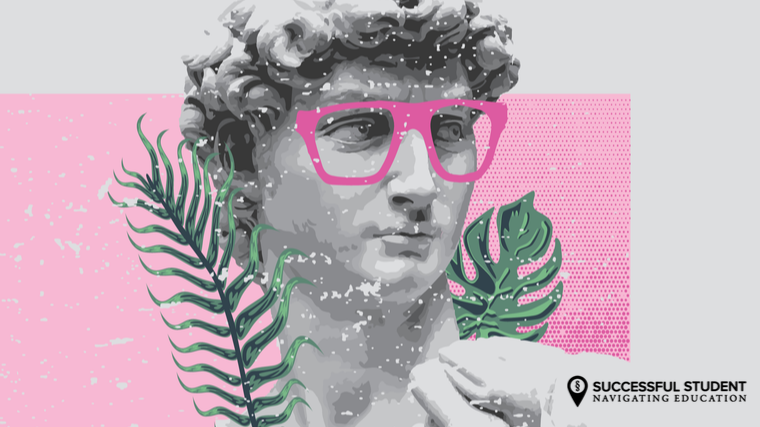What did our forebears think centuries ago about the noble endeavor of education and learning, that we can still use today to be successful students? A classical education in modern schools.
Classical Education in Modern Schools
It's important to see the past as a way of understanding the present in terms of how the present differs and how it is the same as the past.
"Every age has its own outlook. It is specially good at seeing certain truths and specially liable to make certain mistakes. We all, therefore, need the books that will correct the characteristic mistakes of our own period. And that means the old books...People were no cleverer then than they are now; they made as many mistakes as we. But not the same mistakes"
C. S. Lewis, On the Reading of Old Books
So what did the great thinkers of the past think about education?
In the Republic, the well-nurtured youth is one ‘who would see most clearly whatever was amiss in ill-made works of man or ill-grown works of nature, and with a just distaste would blame and hate the ugly even from his earliest years and would give delighted praise to beauty, receiving it into his soul and being nourished by it, so that he becomes a man of gentle heart. All this before he is of an age to reason; so that when Reason at length comes to him, then, bred as he has been, he will hold out his hands in welcome and recognize her because of the affinity he bears to her.’
C. S. Lewis, The Abolition of Man, referring to Republic 402a
"Can you be righteous unless you be just in rendering to things their due esteem? All things were made to be yours and you were made to prize them according to their value"
Thomas Traherne, (Centuries of Meditations, i 12)
"For the correct analogy for the mind is not a vessel that needs filling, but wood that needs igniting."
Plutarch, On Listening to Lectures, 23
St. Augustine's 'virtue' is defined as ordo amoris, giving each object the proper degree of love which is appropriate to it (De Civ. Dei xv 22). Aristotle said that the aim of education is to make the pupil like and dislike what he ought (Eth. Nic., 1104 B).
The common thread in the conception of classical education is that there is an objectively true and proper correspondence between the kind of thing nature is and the kind of creatures that we are.
These sentiments, it was believed, are already inside of us and should respond properly to real truths about nature, and it was believed to be education's job in nurturing these innate sentiments.
Modern education largely operates under the belief that our sentiments towards nature and ethics are subjective and personal (e.g., beauty is in the eye of the beholder), and not an appropriate or inappropriate response to truths built into nature.
There are, of course, more aspects to classical education than this, but this was certainly one of the main thrusts of it. There is, however, a resurgence of classical education occurring.
The classical curriculum at these schools isn't just a matter of adding a few language or philosophy classes to an otherwise entirely modern education; rather the schools are taking a more all-encompassing approach of dividing the classical education curriculum into the medieval trivium of grammar, logic and rhetoric.
Grammar
Grammar is taught starting in kindergarten and lasting to fourth grade, in which children learn basic facts and math, poetry, spelling, music, the natural world, the history of mankind starting with the ancient Greeks, Egyptians, and Romans. Students also begin learning languages such as Latin.
Logic
Then comes the Logic education, which starts in fifth grade and lasts through eighth grade, in which children learn powers of evaluation, analyzation, discernment and inquiry.
Students learn algebra, participate in discussions, learn argumentation and cause and effect, as well as offering and defending a thesis, while still learning Latin.
Rhetoric
Lastly, there is the Rhetoric stage, beginning in ninth grade and lasts through twelfth, in which students focus on knowledge and idea application and expression through writing and speaking.
At Catholic school St. Jerome Academy in Hyattsville, Maryland, seventh graders compete on who can be the quickest in writing past and future tenses of Latin verbs.
When asked about adopting this form of education, Mary Pat Donoghue, St. Jerome's principal, said:
"When we started developing a new curriculum, we were trying to save our school. But now, in an era of growing malaise and cynicism, we're equipping young minds and hearts to save civilization itself."
Catholic schools near Rochester, New York, Denver, Colorado, and Lexington, Kentucky have followed suit and adopted the same curriculum as St. Jerome's.
Combining these stages of learning with current educational models was made popular, in part, by Dorothy Sayers, friend of C. S. Lewis and J. R. R. Tolkien, in her essay "The Lost Tools of Learning" presented at Oxford University in 1947.
In this essay Sayers wrote:
"And today a great number--perhaps the majority--of the men and women who handle our affairs, write our books and our newspapers, carry out our research, present our plays and our films, speak from our platforms and pulpits--yes, and who educate our young people--have never, even in a lingering traditional memory, undergone the Scholastic discipline. Less and less do the children who come to be educated bring any of that tradition with them."
Lost Tools of Learning
Scholastic discipline was the medieval practice of applying reason to beliefs that were matters of faith in medieval thought. By extension, medieval thinkers developed and taught important philosophical ideas that were not directly related to theology, and where the trivium of grammar, logic and rhetoric was developed.
In the essay Sayers explains that being taught how to learn is more important than being trained for a specific task, for in so doing anyone can learn just about anything.
She makes the point that an entire society, each trained only in specific tasks, will not see the end purpose for which the individual work is for, nor what all of the collective work is supposed to amount to; they will miss the interconnected synthesis and the bigger picture.
At St. Theresa Catholic School in Sugar Land, Texas, the pre-K-through through fifth-grade school has approximately 160 students enrolled each year. Second-graders will learn Greek history, with, for instance, the help of "The Iliad" and "The Odyssey" (both written for children). Latin study begins in 1st grade.
Principal Jonathan Beeson notes:
"There's nothing in classical education inherently conservative or liberal. And we're not scared of memorization. Kids need content in their brains and they're wired to absorb it. You can't reflect on something if it's not in your brain in the first place"
In 2011, The Association of Classical and Christian Schools conducted a survey of graduates which showed that 98.3% went on to attend college, of which 34.8% chose to attend a Christian university, and the most popular among the remaining 63.5% chose USC, Georgia Tech, and the U.S. Naval Academy. In addition to producing students with a high propensity for attending college, a classical education seems to have a bearing on scoring higher on standardized tests.
For instance, on the SAT the class of 2012 averaged scores that were significantly better than our national average. Certain schools have instantiated classical education types of learning into charter schools (which are public). Ridgeview Classical Schools is located in Fort Collins, Colorado.
The Barney Charter School Initiative is opening classical education charter schools around the nation. It is a collaboration with The Barney Family Foundation and Hillsdale College, a liberal arts college located in Hillsdale, Michigan.
The collaboration has brought schools to Lewisville, Texas, Moriarty, New Mexico, Savannah, Georgia, and Bentonville, Arkansas.
More resources:
- The 30 Best Online High Schools
- The Best Private Schools
- Financial Aid Guide for Online College Students
- What are 529 Plans? FAQs Answered
- The Best Online Humanities Degrees for Careers
Use our Degree Finder to find a program and request free information from a college today.

